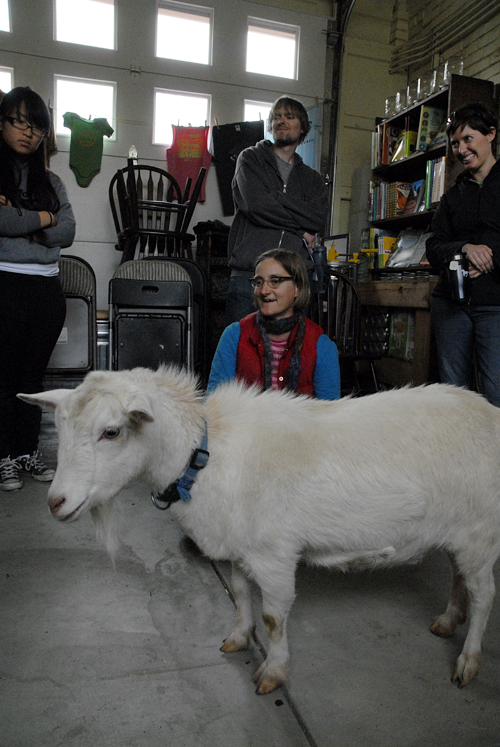
Mother's Day this year was a bit atypical. My interest in urban farming had peaked with the possibility of raising goats in my Oakland backyard and I needed a dose of reality. So, instead of brunching with Mom I spent the morning learning about goat husbandry in an Urban Goats 101 class at the BioFuel Oasis.
The BioFuel Oasis is a worker-owned cooperative in Berkeley specializing in ASTM quality biodiesel made from recycled vegetable oil. In addition to supplying BioFuel, they offer urban farming classes in Beekeeping, Raising Chickens & Ducks, Basic Vegetable Fermenting, Raising Milking Goats and other DIY pursuits.
Novella Carpenter, an Oakland-based urban farmer (GhostTown Farm), owner/worker at BioFuel Oasis, and author of Farm City: The Education of An Urban Farmer teaches like she writes. Her casual yet methodical approach contains hints of dark humor sprinkled lightly with four letter words. Learning to raise goats in the ghetto had been an iterative process -- there was no definitive "urban goat manual" and the lessons learned from owning other city farm animals (chickens, ducks, turkeys, rabbits, pigs) didn't necessarily translate. Throughout the class, Novella shared her methodology along with lists of essential information to raise milking goats in an urban environment. Clearly the need for guidance in urban farming provided inspiration for teaching this class and writing the much needed general manual, The Essential Urban Farmer, Novella's forthcoming book.
I love a good class handout and Novella's 8-page Goat 101 packet was extremely informative and well-organized. It opened with this sobering statement:
Warning: No one should enter into goat husbandry without full knowledge that goat ownership is an all-engrossing hobby that will suck up your time and money.
She covered legal issues; dispelled goat myths; described different types and breeds of goats; provided a list of essential housing and caretaking necessities; and shared how to buy, breed, and milk goats.
-
Here are some goaty reality factors that might stop you from responding to a Craigslist ad on a whim:
- To keep milking goats lactating they need to be bred annually. So, that means you are also a goat breeder and need to deal with stud services, birthing and (goat) kids.
- Male goats stink and it is illegal to own them in Berkeley. If your goat gives birth to a male kid you will need to have a plan how to deal with him. Selling, giving away or eating are your basic options.
- Goats don't like to be alone so you need to have at least two females, ideally three. (Berkeley law allows only two female goats per household. Oakland law was only specific about goats not being raised on properties occupied by apartments, hotels or in a business district. San Francisco law was only specific about goats not being used for animal sacrifice but did cite a limitation of four small animals total.)
- Dogs and goats are natural enemies (however, goats and chickens are compatible)
- "Goats are not lawnmowers. Many a person has been disappointed when they brought their goats home and expected them to trim the grass, and instead the goats denuded the shrubs and trees first....But the main feed for your goat should always be hay."
- Be prepared to spend $500-600 for a good quality milking doe.
After the didactic lecture plus Q&A we moved into the experiential goat-handling portion of the class. Blue-eyed Milky Way and bearded Orla May entered the space and brushing and hoof trimming was demonstrated and practiced. Novella went through the motions of demonstrating milking technique but her milker goat Bebe was off getting "freshened" so she was not available for an actual milking demo. That was my only disappointment. I was hoping to witness actual goat milking and possibly have a hands-on experience and tasting. However, taking photos and interacting with these unfamiliar and extremely cute creatures was quite a thrill.
The folks attending the class ranged from goat owners to goat-curious. The class was 3 hours long, cost $30 and was kept to a comfortable size so all participants wanting to handle the goats had easy access. Novella brought samples of her own GhostTown Farm goat cheese for tasting and briefly discussed goat milk products. A great class to follow this general introduction would be "How-To make Goat Milk Cheese, Yogurt and Kefir."
Novella will be teaching this class again on Sunday, June 20th from 9:30am to 12:30pm. It will be taught at a house with a backyard so there is more natural space for the goats to wander around. If you are even slightly goat-curious I recommend attending, but register ASAP because her classes sell out quickly.